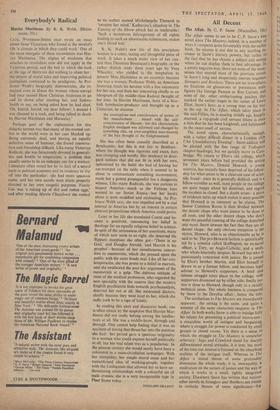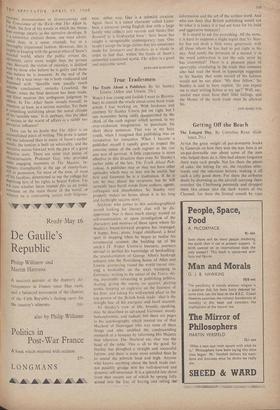The Affair.. By C. P. Snow. (Macmillan, 18s.)
The A flair seems to me to be C. P. Snow's best novel since The Masters; indeed, in a number of ways it compares quite favourably with the earlier book. Its success is not due to any startling in- crease in Snow's literary powers, but rather to the fact that he has chosen a subject and setting where he can display them to best advantage. In a purely negative way, there are none of the weak- nesses that marred most of the previous novels in Snow's long and desperately uneven sequence Strangers and Brothers. There are no love-affairs, no fixations on glamorous or portentous male figures like George Passant or Roy Calvert, and none of the other embarrassing patches that marked the earlier stages in the career of Lewis Eliot, Snow's hero, as a young man on his waY to the top. In The Affair, which takes place In the mid-Fifties, he is nearing middle age, happilY married, a top-grade civil servant (there is eve° a hint that he has been knighted), and habituated to the sweet smell of success.
The novel opens, characteristically enough, with a rather difficult dinner in a London club (`An Unsatisfactory Evening': Snow-addicts Will be pleased with the fine range of Trollopian chapter-headings), but we quickly move to Calw bridge. We return to Eliot's old college, which seventeen years before had provided the setting for The Masters. Donald Howard, a young scientist, has recently been deprived of his fellow- ship for what seems to be a clear-cut case of scien- tific fraud: since he is generally disliked, and is 3 fellow-traveller as well, most people in the college are quite happy about his dismissal, and regard the incident as closed. But a doubt arises: a piece of evidence turns up which makes it seem possible that Howard is as innocent as he claims. The Senior Common Room is then divided between the decent chaps who want justice to be done at all costs, and the other decent chaps who don t want the peaceful running of the college disturbed any more. Snow stresses the fact that they are all decent chaps : the only obvious exception is the victim, Howard, who is as objectionable as he Is said to be. The pro-Howard faction is quixoticallY led by a scientist called Skeffington, an ex-naval officer, a Tory, an Anglo-Catholic, and a snob, who whole-heartedly despises Howard but who Is passionately concerned with justice. He is joined by Eliot's brother Martin, and Eliot himself Is drawn in as a former fellow, and becomes legal adviser to Howard's supporters. A brief and intense struggle takes place in the college, with supporters drummed up by either side; finally jus- tice is done to Howard, though only in a strictlY technical sense. The whole business is compared by Snow to the Dreyfus affair : hence the title. The similarities to The Masters are immediatelY apparent: the setting is the same, and quite a number of the same characters reappear in The Affair. In both works Snow is able to indulge fullY his talents for presenting a political microcosm: a masculine world of intrigue and bargaining,
where a struggle for power is conducted by small groups in closed rooms. Yet there is a sense in
which the struggle in The Masters is somewhat
arbitrary : Jago and Crawford stand for sharplY differentiated moral attitudes, it is true, but most of the time our interest is focused on the absorbing
realities of the intrigue itself. Whereas in The Affair a moral theme of some profundity
dominates the whole work; it is, inescapably ,.a meditation on the nature of justice and the way Id which it works in a small, tightly integrated
society. Elsewhere Snow has written that various other novels in Strangers and Brothers are meant to embody themes of some significance—for ample. possessiveness in Homecomings and Conscience of the Rich—but The Affair is,
; think, the first of his novels in which the theme
u,,nes emerge clearly as the narrative develops. It !' a. somewhat abstract theme, one must admit; Ji,nslice does, in a sense, triumph, but in a juuroughly impersonal fashion. However, this is ,ely in keeping with the general ethos of Snow's iletional world, where the public virtues do, iiimately, carry more weight than the private 1,0nes. Howard, the victim of injustice, is disliked ooth by those who believe he is guilty and those \bqlo believe he is innocent. At the end of the a neat twist—he is both vindicated and "IsPensed with. 'Sensible men 'usually reach nsible conclusions,' remarks Crawford, the "vlaster, when the final decision has been made, 4nd Eliot receives this ambiguous judgment in Ileoce. In The Affair Snow reveals himself, in intention, at least, as a serious moralist. Yet there IS something stultifying about the moral climate Of his 'sensible men. Is it, perhaps, that the ideal uf success in the world of affairs is a rather too Pervasive influence?
. There can be no doubt that The Affair is an complished piece of writing. The prose is tauter old less laboured than in many of Snow's earlier novels; the tension is built up admirably, and the narrative moves forward with the pace of a good detective:story. There are some nice pieces of characterisation. Professor Gay, who provided sulne engaging moments in The Masters re- 413.Pears triumphantly at the age of ninety-four, st!il in possession, for most of the time, of most ()I his faculties, determined to sue the college for depriving him of his rights as Senior Fellow. I'm n°1 sure whether Snow intends this as an ironic comment on the main theme of the novel, or ''''h•ther he is contrasting justice with litigious' ness: either way, Gay is a splendid creation. Again, there is a minor character called Lester Ince, a uxorious young English don with a large family who collects jazz records and thinks that Beowulf is 'a God-awful bore': here Snow has caught a recognisable contemporary type. One needn't accept the large claims that 'are sometimes made for Strangers and Brothers as a whole in order to feel that, within the limits of Snow's somewhat constricted world, The Affair is a good and enjoyable novel.
BERNARD BERGONZI



































 Previous page
Previous page